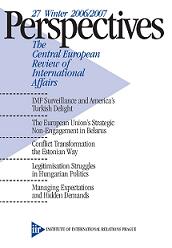Managing Expectations and Hidden Demands: Options for the German EU Presidency
Managing Expectations and Hidden Demands: Options for the German EU Presidency
Author(s): Andreas MaurerSubject(s): Politics / Political Sciences
Published by: Ústav mezinárodních vztahů
Keywords: EU presidency; EU institutional reform; EU constitutional treaty; German EU policy
Summary/Abstract: The “pause for thought” decreed by the heads of state and the government (after the voters in France and the Netherlands rejected the Treaty Establishing a Constitution for Europe) has been extended for at least another year. The European Council meeting held on the 15th and 16th of June 2006 did little more than sketch out the way forward for the period 2006–2008. By the end of 2008, decisions should be made about how to continue the reform process. Before anyone can agree on how to move forward, all 27 European Union member states would have to state clearly what goals they are pursuing in the process of institutional reform (a process which all sides agree is necessary) and what steps they believe are required for achieving these goals. In this context, clear statements on the importance of the Treaty and its fate are needed. It is unlikely that Consensus on these issues be achieved among all 27 member states. Regardless, in order to allow a constructive discussion to take place, the 27 member states would have to agree on a shared criteria for assessing the reform proposals, that are on the table and on the options for resolving the “constitutional crisis.”
Journal: Perspectives : Review of International Affairs
- Issue Year: 2006
- Issue No: 27
- Page Range: 100-116
- Page Count: 17
- Language: English

